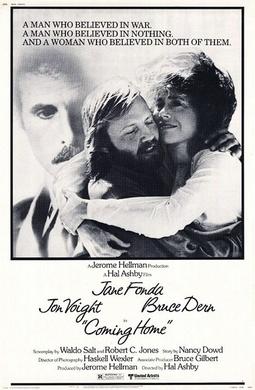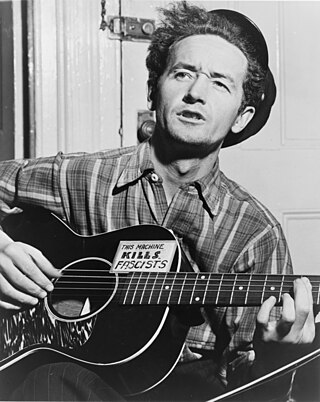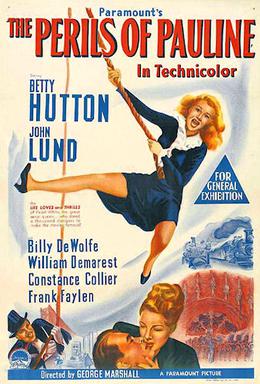Plot
In 1936, Great Depression, Woody Guthrie sits at a gas station, playing guitar as other men talk about leaving town for California or the Texas Gulf Coast. When a customer named Collister offers $1 to anyone who can tell him something Woody wins the dollar by figuring out Collister's worries about the future. Later, as Woody paints a store sign, his wife, Mary, encourages him to keep painting because it is his only skill that makes money, but he annoys her by putting down his brushes and picking up his guitar. Two ladies take Woody to a despondent woman who refuses to drink, and he uses psychology to get her to swallow a glass of water. At the dinner table, Mary complains that Woody should look for work, so he walks around town, offering to paint signs. When a store owner hires him to paint a white-on-black sign, Woody paints it white-on-red instead, so the owner refuses to pay him.
At a bar, Woody sings a song for a young woman named Sue Ann, then goes home with her. Later, as Woody sits on his porch, Heavy Chandler, recently released from the state hospital, stops to talk to him about being crazy and having pictures in his head. Woody gives him paint brushes and paint and tells him to put his thoughts on paper. As Woody plays fiddle with a local band at a square dance, children rush in to warn about a dust storm. Huge clouds of dust roll in, blinding and choking everyone, forcing them into their houses. Lying in bed with Mary, Woody hints that it is time for him to go elsewhere for work. Later, Woody leaves a note for Mary, puts on his coat and hat, and hails a ride with a passing truck driver. After hitchhiking for several days, he climbs aboard a train with a couple of African American hobos, including Slim Snedeger, but when a brawl breaks out inside their crowded boxcar, Woody and Slim jump off and grab onto a ladder leading to the top of another freight car. Later, the train stops for a group of railroad men hired to round up vagrants, force those with money to pay for a passenger train, and send the rest walking. Slim has money for the train, but Woody is broke, so they agree halfheartedly to meet someday in California.
Woody hitches a ride with a middle-class couple, but insults them and they stop to let him out. At a bar, he gets a free meal by playing the piano and singing his songs, then spends the night with a waitress. Heading west, he gets a steady ride with a family in a truck packed with furniture, but police stop them, along with dozens of other destitute people, at the California border. The police require that families have $50 before they are allowed to proceed, so Woody leaves the caravan and walks to a nearby camp, where a hobo shares his blanket. Later, Woody hops a train with another hobo, but a train guard shoots the man off the top of a boxcar and Woody hides between two cars until the train reaches the outskirts of Los Angeles. There, he works for his dinner at a chili café, and meets Luther and Liz Johnson, a young migrant couple with children, looking for work picking fruit. They drive from camp to camp, but find the camps have more workers than they need, and the few jobs open pay only four cents a bushel. Woody goes to town and stops at a soup kitchen, offering to paint a sign in exchange for soup. The server, Pauline, says they only have soup, but she would accept a painted sign as a favor.
The next day, a fruit company hires only a few extra day workers, leaving hundreds of people without work. Luther tells Woody all the camps are the same, so there is no sense leaving. Woody returns to the soup kitchen, paints a professional sign, and asks Pauline for dinner at her place, but she refuses. Back at the camp, a popular union organizer and radio entertainer, Ozark Bule, drives in with his guitar, stands on his car, and sings union songs. As night falls, Ozark's impromptu show turns into a hoedown, as Woody and other musicians join in, singing folk songs. Company goons break up the hoedown and start a brawl, Woody jumps into Ozark's car and escapes with him. Ozark takes Woody to the radio station where he works and introduces him to the owner, Mr. Locke. Locke hires Woody at $20 a week to play on Ozark's Thursday program, and Woody becomes popular by singing personal songs that relate to Depression woes. He drives to the fields with Ozark to preach about the union, but company thugs chase them off. The two also sing at union halls, where provocateurs start fights. When Pauline finally invites Woody for a home-cooked meal, he learns she is a rich widow living in luxury, and he asks if she is embarrassed about having so much while others have nothing. He tells her about the down-and-out people he met on the road, and how generous they are, whereas people with money are defensive.
Still, he says, Pauline is the only rich person who ever looked back at him. He spends a few nights with her, but when she expresses her happiness, he confesses that he has a wife and kids in Pampa, Texas, then leaves. With stacks of fan mail arriving at the radio station, Woody and singer Memphis Sue get a show of their own, with a higher salary, but Locke insists that new sponsors want Woody to refrain from singing about unions and down-trodden workers. Though Woody resists, Ozark tells him his radio job is to entertain and stay popular, not to preach. At first Woody goes along, but soon performs his hard-edged songs, and Locke demands a song list ahead of time. In the meantime, Woody brings Mary and their children to Los Angeles, where he has rented a house, but he feels uncomfortable with the greed and wealth around him and says it was easier when everybody was poor back in Texas. Mary is worried about his rebelliousness because she does not want to go back to Luther, bruised from a beating, visits Woody at the station to tell him how much his songs inspire people in the field, and asks him to keep it up.
After delivering a list of safe songs to Locke, Woody tears up a studio room in frustration. Carrying his guitar, he hops a train, leaves Los Angeles, and visits migrant camps, factories, and packing houses, singing protest songs. At a fruit packing plant, company men beat him and smash his guitar. Woody lives in boxcar riding, talking to people he meets, including a runaway boy. When Woody returns to Los Angeles, Locke gives him one last chance, then fires him for dedicating a song to farm workers. As Woody leaves, Ozark tells him that Baker, an agent, booked him on a coast-to-coast CBS radio show and at an audition for the Ambassador Hotel's Coconut Grove. Woody buys toys for his children, but when he gets home, Mary and the girls are gone. At the hotel audition, the owner likes Woody but wants to dress him in overalls and put him in a hillbilly band. Woody walks out, telling Ozark he does not want to sing for the rich and lose touch with real people. He goes to the railroad yard, jumps on a train, and sings his songs from the top of a boxcar.









